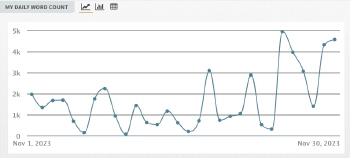If completing Nanowrimo for the first time in 2024 has taught me one thing, it’s this one truth.
If you can think, you can write
It’s a simple concept, and while there may be plenty of books, websites, courses, and podcasts you can use to help you hone your writing craft, you don’t need them to get started. You simply have to begin.
Let me go back a bit.
I’ve always wanted to be a writer. My initial thoughts around the subject surmised that as I loved to read, I must also love to write as well. Whether this was true or not, I wrote stories as a child and wrote essays for school and college. Expanded on my writing chops at University, crafting essays on subjects that interested me and culminated in a 10k essay for my master’s final which garnered very high marks.
A Career as a Journalist Beckoned
Before I’d even thought of doing an MA, I attended courses in Journalism to learn how to write articles for news and media outlets, I learned from two very good journalists, an Editor for the Daily Mail (even at that time, Britains most read newspaper) and another who worked for the Reuters the global financial information and news outlet.
The aim was to switch careers (eventually) from the tech career path I’d been following since I left school. My dream was to be out there taking notes and writing killer copy that would get me a byline in my favourite paper of choice The Guardian which I’d been reading since I was a teenager. I also spent about a year doing reviews for an online theatre review portal called Extra Extra. I loved it. Getting to see large and small shows all over London and have my reviews published online and in print. It was brilliant.
Sadly I didn’t pursue the journalist career path, but the feeling of producing a good piece of writing that people enjoyed reading has never left me. Fast forward a few years and I began writing online. Wanting to improve my writing and concentrate on actually writing fiction, not just blog posts or news articles, I attended courses, participated in writers’ sessions and subscribed to numerous writing communities that helped me to improve technique, structure, idea generation etc.
In particular, I enjoy free writing, where you’re given a prompt of some sort, and you then write for 5-15 minutes. The writing could be directly related to the word or picture prompt, but it needn’t be. The prompt is essentially to get your creative juices flowing and could result in a piece of poetry or prose, a rant or just a stream of consciousness. It didn’t matter, the point of a free write is to simply write whatever comes to you in the time allotted with no editing.
And this brings me to the central premise of this post. Writing is a matter of transferring your thinking from inside your head to outside your head, to a medium that other people can use to read it. It requires no more energy or technique than that.
During Nanowrimo, the object is to write the first 50k words of your book in 30 days. This translates to a daily word count of 1667 words per day. On some days I achieved the word count, on others, I was woefully short. Still, there were days when I exceeded the daily count to such an extent that for the first time in 10 years, I completed the challenge.
How did I do it?
Nanowrimo Daily Word Count
I sat at a computer every day and transferred whatever was in my head that day onto the screen. Don’t get me wrong, I had a story that I wanted to tell, and this year I’d done more prep than I had in the past, but that wasn’t what got me past the finish line. In previous years I’d created outlines, characters and a general plot. This past year, I’d done the same, but I think the story was more fully developed in my mind, still, even with an outline, plot, characters, settings and a story arc, I still had days when I could not think of a single thing to add to my story.
If you check out the chart above, on the day with the lowest word count, I could only muster 90 words for the whole day. I only managed to go above the daily limit on 12 out of the 30 days, but I wrote every day. If it meant I wrote in sprints to achieve the target, I did it. If it meant I could only manage five minutes, I did it. If I fell short of the target, I would resolve to come back the next day and try to do better, but one thing I did do was write something, anything, no matter how trivial every day.
Getting it out of your head
There is something we have over writers of yesteryear. The plethora of tools and gadgets that we have at our disposal is immense, and we can use those tools to get our initial thoughts out without banging away on a keyboard.
For me, once I have an idea, I sit down and put my head down and start typing. It starts as a stream of consciousness, and I make sense of all the words that have tumbled out in a later edit. For others speaking into a voice recorder of some kind is what works for them, then they transcribe (either manually or with software) the recording to create their first draft.
Using AI tools can help your writing practice
I’ve recently started using Limitless for transcribing and making notes for meetings at work. I attend so many, that I was finding keeping track of my notes terribly time-consuming, and the number and frequency of meetings meant it was difficult to catch up.
Limitless is what’s known as a notetaking app that uses AI to take notes from the meetings that you attend. You get a transcription, notes and a summary of the meeting. If you give it access to your emails, it can also produce some meeting prep notes for you based on the participants and any email trail concerning the subject of the meeting.
To demonstrate, I’m going to copy the output that Limitless has given me from a one-minute recording I did about this post.
Transcript
Because I wanna demonstrate, essentially how it works.
So this Article obviously is about getting your words on paper from out of your head.
And in like, I woke with this I woke with this thought this morning.
Because, you know, there there are gatekeepers.
There are people that wanna sell you stuff.
There are people that wanna help just help from a community perspective, you to be a better writer.
But in order to be a better writer, you need to start.
You need to have a practice that helps you to get into the rhythm of writing.
And the more you write, the better that you get.
And it is a case of just getting this stuff The thoughts, your ideas, your stories, your , dreams even out of your head and onto Paper.
You know, the You know, whether that paper is a computer or actually proper paper.
You know, that's that's really what we've got to do.
And that just takes practice.
Notes
Demonstration on how it works
* The speaker is preparing to demonstrate how a certain aspect works
Advice on improving writing skills
* Importance of turning thoughts into written words
* Overcoming gatekeepers and distractions
* Emphasis on starting and maintaining a writing practice
* Writing more frequently leads to better skills
* Practicing on both physical and digital mediums
Summary
Notes and Observations
* The discussion has emphasized the importance of getting ideas out of one's head and onto paper to improve writing skills.
* There are gatekeepers who aim to sell products or help from a community perspective.
* To become a better writer, one needs to start and develop a regular writing practice.
* Writing regularly helps to get into a rhythm, leading to improvement over time.
* The goal is to transfer thoughts, ideas, stories, and even dreams from one's mind onto paper, whether that is actual paper or a digital format.
* The importance of practice has been highlighted as essential to better writing.
It’s not at all bad, and I prefer it over some others such as Otter.ai or Bubble.ai which I find quite intrusive as they invite themselves to all your meetings and at times show up to meetings even if you’re not there.
Using these tools, you can take their outputs and construct outlines or summaries that can trigger even more thought processes or ideas for further writing on a subject.
Conclusion
The point I’m trying to make in this post is that writing is not as hard as you might think. Your thoughts on any given subject are unique to you, even if you’re influenced by research you’ve been doing from multiple sources. In critical thinking, you will take that research and distil the various pieces of information into a conclusive idea. Even if your post isn’t an opinion piece, if it’s a fictional story or a memory of an event, meeting or conversation you’ve had, the important thing to remember is that for others to consume it, you have to get it out of your head.
I like to do this by physically putting my head down, looking at the keyboard and typing the words as they come to me. Others might record their thoughts and then transcribe them. It doesn’t matter which approach works for you, just get going. Practice, and over time, you’ll find that you write more fluently.
Don’t forget, the most important task once you’ve got it out is to edit it, to make your writing engaging and interesting, you have to remove the extraneous elements and ’tighten’ the copy so it achieves the desired results for your audience.
Keep writing, you’ve got this!


